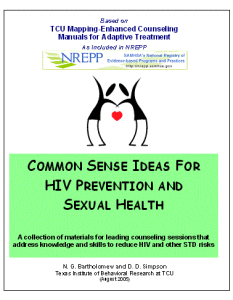
About this intervention
TIC-HIV/Sexual Health equips clients with knowledge and skills necessary to help reduce Human Immunodeficiency Virus (HIV) and sexually transmitted disease (STD) risks. As HIV is substantially higher among U.S. prison and jail populations than among the general public, it is important that correctional settings address this immense problem. This 3-session intervention provides group participants with up-to-date HIV statistics, facts and fiction about HIV transmission, and engages them in an “eye opening” risk game for vicarious learning. Participants are taught how to act assertively to protect their health through the use of practical role-play scenarios designed to identify core issues while portraying healthy ways to handle sexual risk invitations. The sections of the intervention include HIV Update, Acting to Protect Your Health, Mapping Worksheets, and Links of Interest for obtaining further health information. This intervention includes a collection of materials for leading counseling sessions that encourage new ways of thinking about and responding to HIV prevention and sexual health.
Modular applications in this intervention include:
- HIV Update is part of the Approaches to HIV/AIDS Education in Drug Treatment intervention developed at TCU. This session features a leader’s script, handouts, and a participant activity for leading a session on basic HIV information and personal risk taking. Participants are invited to think about risk experientially and to talk with others in their social network about HIV risks. Discussion questions encourage thoughtful reflection about personal risk.
- Acting to Protect Your Health is part of the Approaches to HIV/AIDS Education in Drug Treatment intervention developed at TCU. This session features a leader’s script, with notes, worksheets, and handouts for addressing social anxiety and assertiveness as important issues in communicating about safer sex. Participants are invited to explore their own feelings and communication style when it comes to discussing prevention issues with a partner. Time is allowed for role play to practice new skills.
- Mapping Worksheets — These Mapping Worksheets were adapted from the intervention TCU Guide Maps: A Resource for Counselors and feature a specific focus on HIV, AIDS, communication, and risk reduction. Each mapping worksheet follows a “fill in the blank” format to encourage participants to consider various cognitive aspects dealing with safer sex issues. Once participants complete their worksheet, group discussions and commentary on the HIV issues and interpersonal strategies are facilitated.
- Links of Interest — Websites featuring materials on anger.
Recommended Citation: Bartholomew, N. G., & Simpson, D. D. (2004). Common sense ideas for HIV prevention and sexual health. Fort Worth: Texas Christian University, Institute of Behavioral Research. Available: the IBR Website: www.ibr.tcu.edu